by Lila Selim
Astoria Live Poultry – Gamal Rahman’s shop – is housed in a small unremarkable industrial building lodged between blocks of row houses and an expansive Consolidated Edison power plant, a corner of Astoria that nobody would ever go to without being sent. To the right of Astoria Live’s front door is a very small and ordinary looking butcher shop – ordinary for Astoria, in that there are skinned lambs hanging from the ceiling. Directly ahead, however, is something absurd to see in New York City limits. A small warehouse is lined with chicken cages on every wall. Two or three chickens are in each large cage, organized by color: brown ones, white ones, black-and-white spotty ones. Then the ducks, Cornish hens, and turkeys, are each segregated accordingly. At the end of the chicken room is a door leading to a backyard where a herd of a few dozen sheep and goats stand calmly baaing and munching on grass. Behind them a few docile brown cows stand watch. The first time I visited Gamal’s shop and got the full tour, I remarked how sad it was to see them there so sweet and calm. He said, “Yes, I know what you mean. They’re nice animals. They are cute. But, they gotta go.”
Gamal: Age 55: Astoria, Queens: Owner of Astoria Live Poultry
I came here in 1978 with my father. I wanted to get out of Egypt, to find some opportunity. There wasn’t any opportunity there. I was 23. At home I studied to be an accountant, Accounting for Islamic Societies. Because we can’t charge interest, people have to find other ways to make money. What it amounts to is just that the price goes up if you need to finance something. So you buy a car, it costs $10,000 if you buy it cash. If you want to make payments, the price is $12,000 or $13,000. It’s not called interest; it’s just a higher price. Anyway, there’s a system for accounting and business according to the Shariah, and that’s what I studied at home, in Egypt.
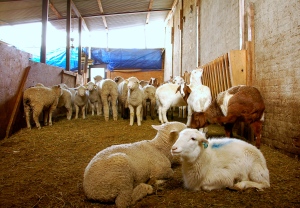 So I came here to New York, and I went to school again, in Manhattan. I studied hotel management, and started working for a Kosher catering company, Ruben’s. They were a famous company at one point. They had 38 locations before they closed. I worked for them for 23 years. I became the head man. I was a big manager there. They were right next to the World Trade Center, and they catered for all the big businesses in the area. Then September 11th happened, and they closed. The owner got some money from the government, and he decided to retire.
So I came here to New York, and I went to school again, in Manhattan. I studied hotel management, and started working for a Kosher catering company, Ruben’s. They were a famous company at one point. They had 38 locations before they closed. I worked for them for 23 years. I became the head man. I was a big manager there. They were right next to the World Trade Center, and they catered for all the big businesses in the area. Then September 11th happened, and they closed. The owner got some money from the government, and he decided to retire.
At the time, there was no halal meat available in New York. Really, there was nothing. You see it all over the place now. Back then it was different. I wasn’t sure it would work. But I took a chance.
I didn’t know what to do. I was single at the time. My wife and I split up before that, and she took our two kids back to Egypt. There were teenagers already. I was staying with the owner of the catering company, my old boss, at his house upstate. I heard about this slaughterhouse in Astoria being available. For seventy years it was a Kosher slaughter house. It went out of business. I thought I would go into business with my old boss. We could buy it together. He already knows the customers for Kosher foods. He didn’t want to do it. He said “I’m retired now. I don’t want to do it. I’ll put up some money if you need it, and you can do halal meat.” At the time, there was no halal meat available in New York. Really, there was nothing. You see it all over the place now. Back then it was different. I wasn’t sure it would work. But I took a chance.
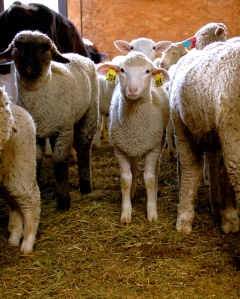
At first, I didn’t like it. I used to wear a suit to work. I was in charge of so many people. I stayed clean all day. This is very different. The people who drive cabs here, they have a complex. They all want that too. They want to wear a suit, and sit at a desk, and be the manager of something. They don’t feel good about their work. I’m no different from them. But I’ve gotten over it now. I like my work. I own the business. I have six employees. But I still do the slaughtering myself. Because it’s halal, you have to say the prayer first. My employees are these Hispanic guys, and they don’t know the prayer. So I do that part. That’s part of why I like my job, because I’m saying the name of God so much all day, and it makes me feel good. I learned how to do it from my father. He taught me how.
My employees are these Hispanic guys, and they don’t know the prayer. So I do that part. That’s part of why I like my job, because I’m saying the name of God so much all day…
When you’re with your parents, at home, they teach you how to do everything. They teach you how to clean your teeth, how to speak, how to eat. Everything. As parents, they want to see themselves in you. Families are so close. At home, I have everybody around me. I feel very safe. Not like here. Here nobody talks to their families. They live far away from each other. My son lives in Connecticut, and I don’t see him. It’s just me and my wife. In the morning, I come to Starbucks and eat some breakfast. I talk to a few people here, then I walk to work. That’s it.
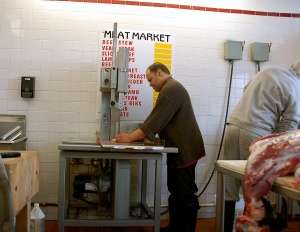 Business is not so good right now. It’s ok. But not enough. I need to figure out bring in the American customers. I sell the meat directly to the people. Now I have the Bengalis, the Pakistanis, the Arabs, a few Hispanics, and very few Americans. American people need to be educated about what halal means. It’s practically organic, though we’re not certified for it yet. The animals are in Pennsylvania. The cows are 100% grass fed. The lambs are grass fed. They get no injections, no hormones, no antibiotics. I see them myself. Once a month I go to Pennsylvania to see them at the farmers. Then they’re shipped here, and I kill them with my own hands. I drain their blood myself. No machines. People would like this process if they knew about it. And people are curious to know about it. They just need to be educated about it and see. If I could get the Americans to come into my shop just once, and try a steak, they would become my customers. And then I would start to feel secure.
Business is not so good right now. It’s ok. But not enough. I need to figure out bring in the American customers. I sell the meat directly to the people. Now I have the Bengalis, the Pakistanis, the Arabs, a few Hispanics, and very few Americans. American people need to be educated about what halal means. It’s practically organic, though we’re not certified for it yet. The animals are in Pennsylvania. The cows are 100% grass fed. The lambs are grass fed. They get no injections, no hormones, no antibiotics. I see them myself. Once a month I go to Pennsylvania to see them at the farmers. Then they’re shipped here, and I kill them with my own hands. I drain their blood myself. No machines. People would like this process if they knew about it. And people are curious to know about it. They just need to be educated about it and see. If I could get the Americans to come into my shop just once, and try a steak, they would become my customers. And then I would start to feel secure.
Then they’re shipped here, and I kill them with my own hands. I drain their blood myself. No machines. People would like this process if they knew about it.
Islam is growing in America though. You see there are so many mosques here. There are twelve mosques in Astoria. Three or four more in Woodside, and so on. I have the list. I call all of them before the holidays to see if they want to make an order. It wasn’t that way when I got here, even ten years ago. And there were even less in the 80’s. But we have a problem. Some people are interpreting the religion the wrong way. They’re taking it to an extreme. The religion itself is beautiful. Every religion is beautiful. I believe it. But it is beautiful, and peaceful: the discipline, the morals, the principles of it.
The mosques need to do a better job of showing people how to act. I mean for the Muslims to see how to act, and for the Americans to see what Islam really looks like. There was a point, when I just got here. My wife and son were with me. He was very small at the time. And we were desperate. I couldn’t find a job. Things were very difficult. We didn’t have any food in the house. We went to a church, and they helped us. They gave us help. You should be able to go to the mosque and ask for help. It’s in the religion. Islam is supposed to be a community service. Some of them do this already, but they need to do it better, so people can see it. So they can see it’s about community service, and not violence. There’s no violence in Islam. The Koran doesn’t say to kill anybody. There’s no violence in any religion. It’s just these few people who interpret it badly.
I can’t convince you my steak is good. You need to try one to believe me. It’s the same thing. I can’t convince you that Islam is good. You need to see us acting well.
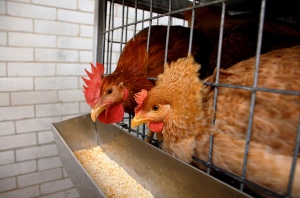 I was walking a while ago, outside of my shop. One of my neighbors was walking near me. He was singing a little bit. He’s been my neighbor at the shop for five, six years. He was singing “Free the chickens. Kill the Muslims. Free the chickens. Kill all the Muslims.” I said “Hey man. Why are you saying this? We’ve been good neighbors for so long.” He started telling me about some people he knew who were soldiers who died in
I was walking a while ago, outside of my shop. One of my neighbors was walking near me. He was singing a little bit. He’s been my neighbor at the shop for five, six years. He was singing “Free the chickens. Kill the Muslims. Free the chickens. Kill all the Muslims.” I said “Hey man. Why are you saying this? We’ve been good neighbors for so long.” He started telling me about some people he knew who were soldiers who died in
Afghanistan. I told him “Hey. Islam isn’t violent. Take this book.” I gave him a Koran. He stopped by a few days later and told me he’d read some of the book, and he understood I was right. He apologized. I think he was just drunk anyway. He didn’t mean it.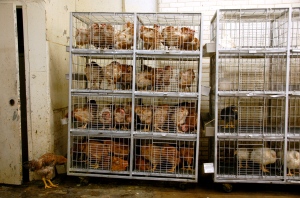 I tried beer before. I tried pork too. I tried everything, because I’m curious. It’s not against religion to be curious.
I tried beer before. I tried pork too. I tried everything, because I’m curious. It’s not against religion to be curious.
But this guy drinks a lot. He’s lonely. When you feel lonely in your heart for so long, it’s difficult. You get frustrated. Some people say Islam is no good. But it’s just those few people, interpreting it wrong. Some people say America is no good. I can’t say that. I can say some politicians are no good, sure. But I’ve been successful here. I’m not going back to Egypt, ever. This is home now. My daughter lives in Egypt. But she’s coming here next year to be a pharmacist. My son finished business school. He got a job, and now he lives in Connecticut, and drives a BMW. My son is spoiled more than my daughter. Because she mostly grew up over there, and he was mostly here. This is a good country. The people who are born in it don’t realize, don’t appreciate it, like my son. I just thank God they’re ok. They’re not on drugs. They’re ok.
I visit Egypt a lot. I was going to go before these demonstrations. But I cancelled. I said “No way. No way I’m going now.” The whole thing is stupid. There’s corruption everywhere. But they had peace. They had some stability. Now it’s chaos. And it’s not safe. It’s no good. My brothers had a business. They had to close because of the demonstrations. Twelve families worked at that business. Now they’re all out of work. For what? Under Mubarak, at least people were safe. I’m staying here.
The last time I went back home, I brought back my new wife. This is my third marriage. My older brother said, “You should marry.” You need somebody to cook for you, care for you. I said “I want to be left alone. I don’t want trouble.” I see trouble, I go. I run away from it. I don’t want headaches. Life is too short. It’s not worth it. And I don’t like to be rushed by anybody. I stopped smoking, 90 days ago. I can’t have trouble.
Lila Selim is a writer of non-fiction, a reader and lover of fiction, and a politics junkie. She is Editor-in-Chief of 12th Street, a literary journal published by the New School’s Riggio Honors Program in Writing and Democracy. She is currently completing her Riggio thesis, a long form work of literary journalism about Muslim communities in Queens, her home turf.
Photos by Yolanda Suarez
Astoria Live Poultry 3137 20th Avenue, Long Island City, NY, (718) 777-7249

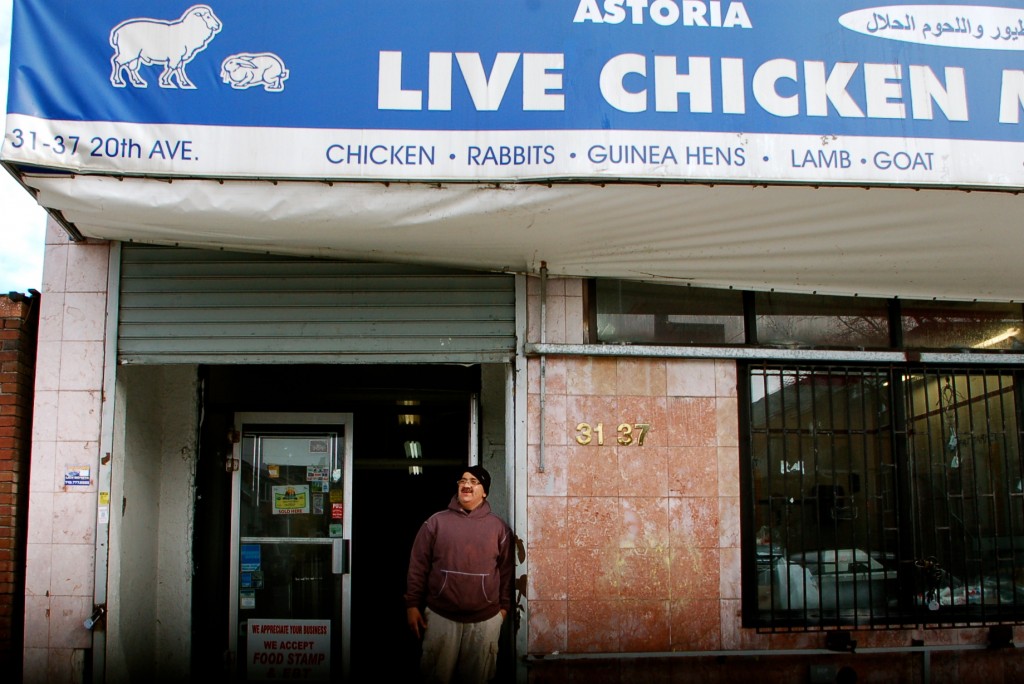
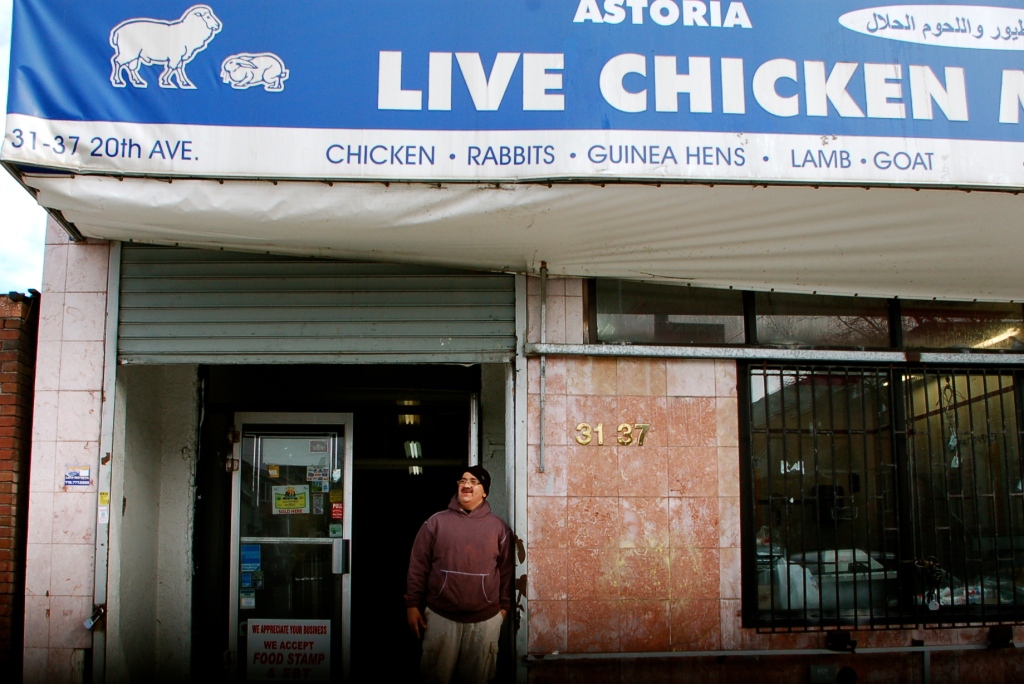
2 Comments
This is a great story. I am gonna have to go check out the place next time I am in town. Another great example of the entrepreneurial spirit of first generation immigrants. This Lila Salim girl, great writer. Gonna have to watch out for more of her work. Keep it up!
This story took me on a realistic journey of a simple man’s life and made me feel what it’s like to be in his shoes…looking forward to many more from Lila!!!